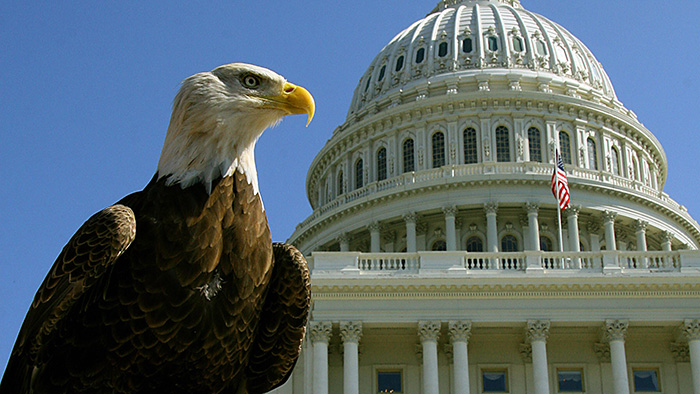[/av_textblock] [av_textblock size=” font_color=” color=” custom_class=”] By Dan Caterinicchia
December 9, 2003
American Eagle Foundation pitching Bald Eagle Coin Act
The Capitol Building is one of the most picturesque structures in a town full of monuments, but last week the scene was more awe-inspiring than normal when a bald eagle flew over the landmark as part of a ceremony commemorating the 30th anniversary of the Endangered Species Act (ESA).
‘Challenger’ the Bald Eagle performed a fly-over from the Capitol Building on Dec. 9 and was joined in the ceremony by Rep. John D. Dingell (D-MI), ESA’s author, and Animal Planet television personality Jeff Corwin. The Act was signed into law on December 28, 1973 by President Richard M. Nixon.
“Challenger is the first eagle in U.S. history trained to free fly during the national anthem,” and has done so during five World Series games, two National Football League Pro Bowls in Hawaii, and myriad other events, including indoor and outdoor corporate meetings and conventions, said Al Cecere, president of the American Eagle Foundation (AEF).
AEF is a not-for-profit organization dedicated to developing and conducting bald eagle and environmental recovery programs in the U.S. and to assist private, state and federal projects that do the same. The group’s goal is to fully restore the bald eagle, America’s national symbol, to the nation’s lands and skies and to “Build A Nest-Egg” for their future care and protection. AEF is headquartered at the Dollywood entertainment park in Pigeon Forge, Tenn.
During Challenger’s visit to Capitol Hill, Cecere spoke to numerous lawmakers about getting the “Bald Eagle Coin Act” introduced and passed next year. If passed, the U.S. Mint will print a commemorative three-coin set and a portion of the proceeds will go to funds that benefit the animals.
“We received interest from a number of lawmakers,” Cecere told USAE, adding that Rep. William L. Jenkins (R-TN), who represents the Congressional district where AEF is located, has agreed to sponsor the legislation.
“The congressman plans on introducing it when Congress reconvenes in January,” Richard Vaughn, Jenkins’ legislative director, told USAE. “He has great respect for, and appreciation of, the job AEF members do.”
Vaughn said while it is a positive step that bald eagles may be taken off the endangered species list next year or in 2005, the de-listing means funding could also dry up.
“Creating the coin for people to purchase will yield profits that can go to non profits to help ensure that bald eagles continue to thrive,” he said, adding that the funds could be used to protect the birds’ habitat and continue monitoring programs.
Cecere said Senate Majority Leader Bill Frist (R-TN) has also voiced his support for the Bald Eagle Coin Act, but AEF is still looking for a sponsor on the Senate side.
AEF does not track its number of member and draws support mostly from corporations and individuals, including some famous animal lovers like entertainer Dolly Parton. “We definitely have some friends in high places,” Cecere said.
The foundation’s activities and programs are recognized by the U.S. Fish and Wildlife Service, Tennessee Wildlife Resources Agency, Independent Charities of America, Animal Funds Of America, Office of Personnel Management, Internal Revenue Service and numerous state fish and wildlife agencies.
Challenger, who is 15 years old, has become a key advocate for restoring and protecting wildlife nationally, but almost lost his life on multiple occasions. He was blown from a nest in the wild during a storm and was hand-raised by the people who found him. As a result of his extensive contact with humans at a young age, the bird thinks that he is a person and cannot survive in the wild. He was released into nature twice and immediately sought out people to beg for food. On the third try, he was placed under the care of AEF and named Challenger in honor of the space shuttle crew.
Challenger will be flying next month in Kitty Hawk, N.C., as part of the 100th anniversary of flight.
[/av_textblock]

